
Occupy Central
Occupy Central is a civil disobedience movement which began in Hong Kong on September 28, 2014. It calls on thousands of protesters to block roads and paralyse Hong Kong's financial district if the Beijing and Hong Kong governments do not agree to implement universal suffrage for the chief executive election in 2017 and the Legislative Council elections in 2020 according to "international standards." The movement was initiated by Benny Tai Yiu-ting (戴耀廷), an associate professor of law at the University of Hong Kong, in January 2013.
OCCUPY CENTRAL - DAY 52: Full coverage of the day’s events
Baptist University president Albert Chan rains on graduate parade
Baptist University president again refuses to present degrees to students with umbrellas
PUBLISHED : Tuesday, 18 November, 2014, 4:22am
Students at Baptist University carry yellow umbrellas and balloons. Photo: Felix Wong
The president of Baptist University declined again yesterday to present degree certificates to graduates because they were carrying yellow umbrellas - symbols of the Occupy Central civil disobedience protests.
Professor Albert Chan Sun-chi, a Hong Kong delegate to the Chinese People's Political Consultative Conference, took a similar stance on Saturday, sparking criticism from students.
Student union president Mio Chan Pin-chun called his response "pathetic". He said the president must have bowed to pressure from "elsewhere", because he had previously supported students' social movements.
Professor Chan denied having come under any pressure. He described the graduates as disrespectful for holding the umbrellas during their convocation.
Meanwhile, it emerged that at least four other students - in addition to three barred on Saturday - had been prevented from leaving for Beijing in an effort to meet state leaders.
At yesterday's graduation incident, held around midday, a graduate of the Academy of Visual Arts and School of Communication knelt before Professor Chan and presented him with a folded yellow umbrella.
"This is a little gift from us students," the graduate said. "We hope the president can listen to the students' demands."
The professor hesitated before he took the brolly, but then made a dismissive gesture and asked the graduate to leave without handing him the certificate.
Two other graduates who later went on stage refused to accept their certificates from him.
Earlier in the day, about a dozen students at another graduation ceremony opened yellow umbrellas as the National Anthem was being played.
"By not giving the graduates their certificates, [the professor] is declining to recognise their education at the university and that they are Baptist University people," Mio Chan said.
"This is really pathetic and has seriously affected the bond between teachers and students. He is trampling on the students' basic freedom of expressing their opinions."
About a dozen students staged a protest outside the venue against the president's "suppression of the freedom of speech".
Professor Chan said that although he appreciated the students' "lofty ideals", he declined to give the graduates their certificates because their actions on the stage showed disrespect for the solemnity of the occasion.
"Hanging around on stage with an umbrella did not look good. It was not raining. Today, they carried an umbrella; what if tomorrow they carry a flag?"
He said it would not be a problem if students wore yellow ribbons - which also signify support for the Occupy campaign for democracy - or carried umbrellas while not on stage.
The professor recited a line from a poem by Chinese philosopher and reformist of the Qing dynasty, Liang Qichao. The meaning of the line is that people with great ambition are not afraid to sacrifice themselves as the target of attack by others.
The graduates who did not receive their certificates from Chan could obtain the papers from the university after the ceremony.
Meanwhile, at least four other students had been barred from travelling to the mainland since the protests began on September 28, student leaders said during an RTHK talk show yesterday.
One of the trio, Nathan Law Kwun-chung, said: "They included student union members, student [volunteers] and some who had helped in our publications."
Alex Chow Yong-kang, secretary general of the Federation of Students - one of the groups leading Occupy - said mainland border officials blocked those students on the grounds they might "jeopardise national security" or "affect state diplomacy".
The failed trips came to light after three federation representatives were barred on Saturday from flying to Beijing.
Additional reporting by Lai Ying-kit
This article appeared in the South China Morning Post print edition as Professor rains on graduate parade
A peaceful exit is the only option for Occupy Central protesters
PUBLISHED : Tuesday, 18 November, 2014, 5:04am
Protesters gather in Admiralty.
The impasse over the Occupy protests has dragged on for more than 50 days. A court ruling could see one of the blockaded sites cleared today, with the police on hand to help bailiffs. The imminent action will be a crucial step. If both sides can exercise restraint and avoid clashes during the implementation, it can, hopefully, bring a peaceful end to the stalemate.
Such an outcome would be in line with public aspirations. A new university survey found that only one-third of people were still supportive of the pro-democracy civil disobedience movement. Nearly 70 per cent said the protesters should leave.
Having had their Beijing expedition thwarted over the weekend, leaders of the Federation of Students are understandably frustrated. They are entitled to ask why their home return permits - the travel document for Hongkongers to visit the mainland - were invalided by the authorities shortly before boarding. That said, the outcome should not have been too much of a surprise to them. Given Beijing's firm position on political reform, the students probably knew from the beginning that their demand for face-to-face discussions with state officials in the capital was a non-starter.
Hopes of more dialogue with the Hong Kong government have also been dashed. Last week Chief Secretary Carrie Lam Cheng Yuet-ngor made it clear there was no room for further talks. She blamed student leaders for toughening their stance after the first dialogue did not yield much.
It has become increasingly clear that the occupiers are facing a red light whichever way they go. As the campaign drags on without any significant achievement, patience and support are waning. While student leaders maintain they will not go home unless the government makes concessions, it is good that some occupiers are more forthcoming, saying they will not resist when police take action to clear sites.
It is time the protesters listened to public views and prepared for a peaceful exit.
This article appeared in the South China Morning Post print edition as A peaceful exit is the only option
Hong Kong protesters urged to refocus struggle on long-term goal
PUBLISHED : Tuesday, 18 November, 2014, 2:28pm
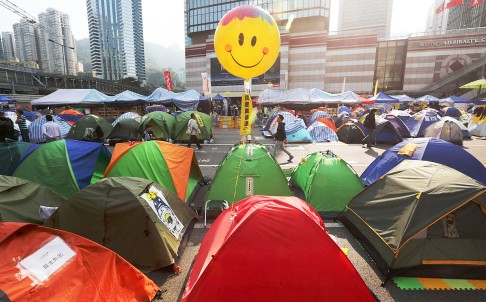
Pro-democracy protesters should consider ending road blockades and refocus on winning the long-term support of the public, one of the co-founders of Occupy Central said yesterday.
Dr Chan Kin-man said that if the public wanted the street protests - now in their eighth week - to end, they may no longer be the best way to fight for democracy.
He was speaking after a Chinese University poll released on Sunday showed that 67 per cent of those questioned wanted the protests to end.
"If the Occupy movement has already stirred up considerable social grievances, it signals that the disruption it caused might have exceeded the [acceptable] level and thus [protesters] should change their methods of struggle," Chan, a sociologist at the university, wrote in Ming Pao.
Occupy first came up with the idea of mass sit-ins for democracy and has helped organise the student-led protests.
Chan said protesters should consider making the occupation more about the democratic and non-violent spirit of the "umbrella movement" by promoting this idea within the community.
That would be instead of "putting all the emphasis solely on the occupied zones and handing over other communities to the anti-Occupy forces, as is the case now", he said.
Chan's remarks came after Chief Secretary Carrie Lam Cheng Yuet-ngor ruled out further dialogue with protesters over their request for a greater say in the election of the city's leaders - and as a small part of the camp in Admiralty was dismantled in accordance with a court order.
If immediate retreat was impossible, Chan said protesters should consider ending protests in Mong Kok and Causeway Bay and limiting the occupation to Admiralty, to minimise the impact on residents. He said activists should also mull a retreat if pan-democratic lawmakers resigned to trigger a "de facto referendum" on democracy, as five lawmakers did in 2010.
Chio Ka-fai, a representative of the Federation of Students, said he agreed with Chan that the protesters needed to prepare for a long-term struggle and talk to more people outside the protest zones. He said they had already sought opinions by knocking on doors to see what people thought about Occupy.
However, he disagreed with Chan's suggestion that protesters should consider leaving.
"We're here only because we want the government to respond. So if we leave before the government does anything, it's a bit like an unconditional surrender or a show of weakness," he said.
Federation secretary general Alex Chow Yong-kang said reducing the area of occupation had been on the agenda long ago, but emphasised that the move should be based on agreement among protesters.
Protester Winona Tse Man-yan had reservations about a proposed retreat, but said limiting the protest zone might help soothe public discontent.
Meanwhile, Chan also announced yesterday that he had resigned as head of Chinese University's Centre for Civil Society Studies, which he co-founded. It focuses on developing civil society across China. He expected he would no longer be allowed to travel to the mainland for academic purposes and that he may face court cases. He remains an associate professor of sociology.
In September, Chan, who had already resigned from the Universities Service Centre for China Studies last year, told the Post that he did not regret "for a single minute" initiating the civil disobedience movement because he saw it as his responsibility.
Dr Wong Hung, an associate professor in the university's social work department, will take over at the Centre for Civil Society Studies, according to Chan.
Separately, two University of Hong Kong graduates were denied entry to the mainland last night when they tried to cross the border at Lo Wu. Former HKU Student's Union president Laurence Tang Yat-long and the union's former general secretary Dickson Chau Ka-faat said they were detained and questioned by officials for an hour and denied entry because they might "jeopardise national security" and "breach mainland laws". At least nine students have been barred from entering the mainland since the protests began.
This article appeared in the South China Morning Post print edition as Protesters urged to refocus struggle on long-term goal
t's still not too late for Occupy to end well
Yvonne Li says even as the clearance begins, there's still time to heal the rift in society, but the community needs to step up and help persuade protesters to leave voluntarily
PUBLISHED : Tuesday, 18 November, 2014, 5:42pm
Unless ordinary citizens find their voice and assist in bringing about dialogue, the schism may never be healed.
The "umbrella movement" will be remembered not only for its political and civic bickering; it will also go down in history as the one event that caused a great schism in Hong Kong society.
In the past, irrespective of anything that transpired, the people of Hong Kong stood together. Now, we have an intolerant community where people are not only standing opposite each other, they are fighting one another. It has been an emotional and stressful period for the Occupy protesters, the Hong Kong government and the police - indeed for all citizens.
Many are debating how a world-class city could be held hostage for more than a month, and almost everyone, including the protesters, are questioning whether the occupation can end peacefully.
While ideas and strategies are being discussed within all camps, from the demonstrators and government, to the pro-Occupy pan-democrats and pro-establishment groups, there appears to be no way to avoid a physical confrontation. What is clear is that the government is running out of ideas and is determined to clear the protest sites. The demonstrators are running out of time and public goodwill as they remain steadfast to their principles.
A purported 1.8 million people have signed a petition asking for the streets to be returned to public use and in support of the police to uphold the rule of law. The public has come out in force, but the student leaders have been quick to denounce its legitimacy. The petition has had little or no effect in changing their minds and the stalemate is now not only with the government but also with a majority of the public.
Backed by High Court injunctions , the clearances have begun. There was little resistance from demonstrators as some barriers were removed in Admiralty. Yet if violence were to break out in the future, such confrontations could provoke more people to come out onto the streets in support of the protesters.
Even if the government and police do manage to clear the sites, the rift in society will remain. While the clearing will, in the short term, open up the roads and enable citizens to get back to their normal lives, the demonstrators could very well start another occupation elsewhere in the future. It would then become a vicious cycle.
Where does the rest of society stand in all this and what can the wider community do? This stalemate requires going beyond signing a petition; it is time for people to step forward and speak to the demonstrators, to help reunify society. Unless ordinary citizens find their voice and assist in bringing about dialogue, the schism may never be healed.
The students are the most passionate among the demonstrators. Instead of speaking to them in anger or lecturing them, the community could put questions to them, to help them consider the consequences of their actions and what their plans will be to assist those who have suffered as a result of the protests.
Expressing tough love while not judging or blaming the students will require tenacity and mindfulness. The students must be made aware that they had the momentum and power at one point, but, by not ending the occupation, they have lost sight of their original intent. Ask them what the best way is to regenerate interest in and commitment to their original intent, which was to gain awareness and recognition of an injustice.
It is important to have principles, but they serve no purpose if they go nowhere and do not help anyone. The protests over an alleged injustice have now led to other injustices; further violence will only add impetus for even more demonstrations. The students' intention to raise awareness has been achieved, with worldwide recognition of their cause. Now is the time for the protesters to change tack and evolve.
Knowing when to stop and producing a clear and practical plan for how and where they envisage future reforms will be key to securing public backing. It is all about expressing views and achieving positive change through genuine influence rather than coercion.
While a peaceful end may appear difficult, the movement can still end on a high note, if the demonstrators willingly cooperate and end the occupation themselves. It will, however, also take help and support from the wider community, with people speaking, writing and discussing without judgment, criticism, anger or blame.
If, for example, 50 citizens from all walks of life speak to the protesters, without politicising the situation, it would certainly have a tremendous impact. But that cannot happen if there is silence and ongoing passiveness from the community.
The rest of the world must be bemused at how Hong Kong can have such a high tolerance for the protests. Most people prefer to go about their daily lives while secretly hoping the movement will disappear. Yet the students came out in the first place to stand up for an important issue when the rest of the community would not.
The "umbrella movement" is not simply about achieving genuine universal suffrage now. The seasoned protesters include workers who are also resolute in wanting a fairer and more equitable society. They are frustrated with the worsening rich-poor divide and the decades of high property prices that exclude the majority from home ownership. They are worried that Hong Kong's individualism and identity as a magnet for all things Chinese and Western are being eroded, due to the government's emphasis on developing the city as an international financial centre and shopping metropolis. This is an ongoing issue that the government will need to address.
By starting from a point of acceptance, genuine dialogue with the student protesters can take place. Expressing an understanding of their situation will allow trust to be established. Where there is trust, there is openness, and ideas and suggestions can be shared more easily. It is not too late to speak to the demonstrators to help them understand that the only way to regain power is to take the high ground; that is, to cease the protests voluntarily.
While this has been a dark period for Hong Kong, the movement can still produce a positive outcome. If that is achieved, then the occupation will go down as one that showed the world how a civil demonstration can go from chaos to order, and the young protesters will have shown their maturity. The outpouring of support will be key to mending the rift and will sow the seeds for future progress. This could well form a new identity for the city, an accepting and mature society that is united in wanting Hong Kong to become the best it can be for all citizens.
Yvonne Li pioneers social innovation and investments in Asia. She is also the founder of the International China Ageing Industry Association. Email: yvonneyyli@me.com
This article appeared in the South China Morning Post print edition as Last ray of hope
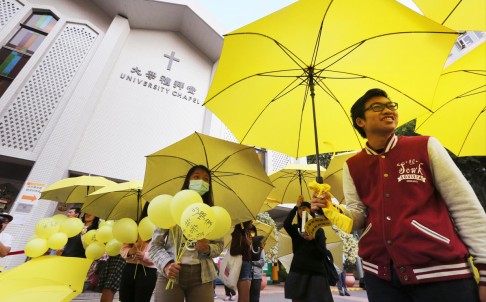
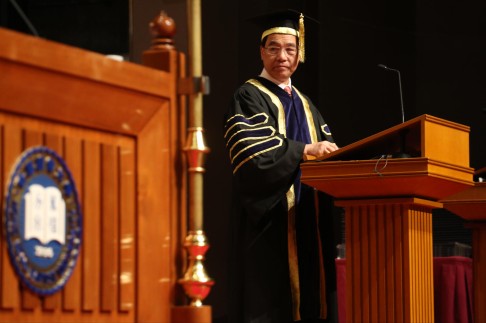
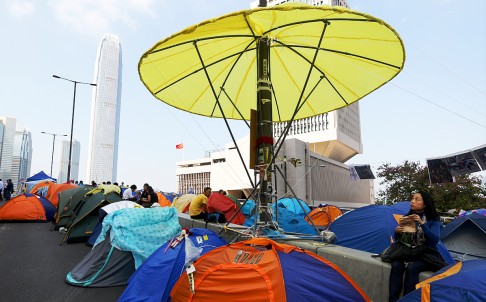
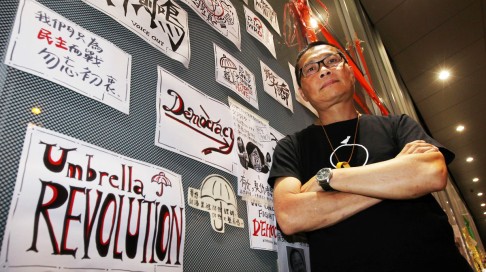
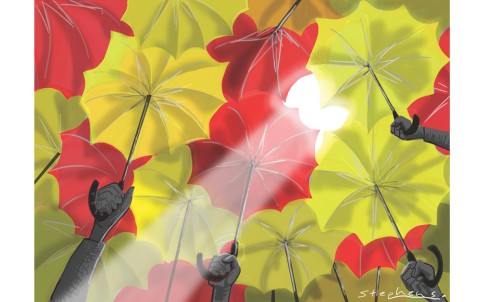
沒有留言:
張貼留言